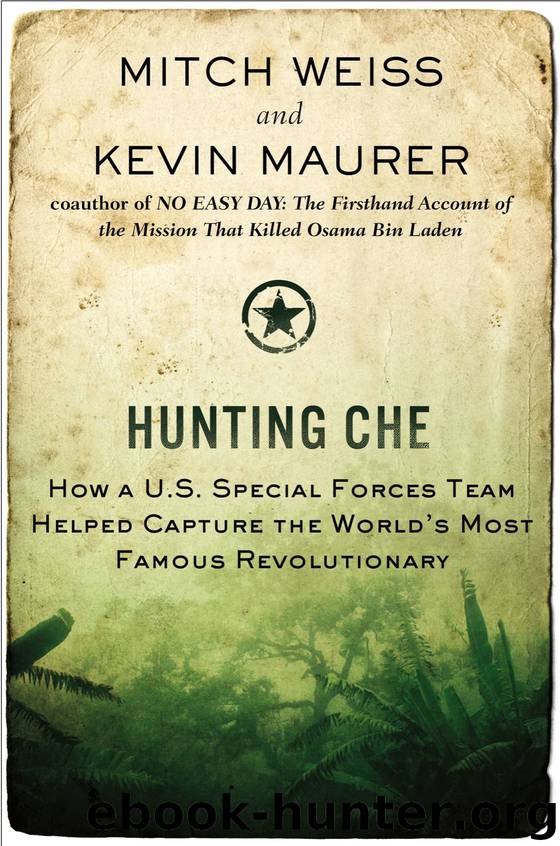Hunting Che by Mitch Weiss & Kevin Maurer

Author:Mitch Weiss & Kevin Maurer
Language: eng
Format: epub, azw3
Publisher: Penguin Group US
Published: 2013-05-28T16:00:00+00:00
* * *
On a Sunday night in late August, Mario Salazar was getting ready for the dance. Every weekend, the Bolivian men gathered around a small band in the La Esperanza plaza. When the right music started up, they paired up and danced the Cueca, a traditional Bolivian folk dance.
It looked a bit like square dancing to the Americans—the partners wheeled and turned around one another, and all the pairs moved together in a simple choreography round the plaza, with white handkerchiefs fluttering like doves from every right hand. The partners never touched each other, but maintained contact through facial expressions and mirrored movements.
It was a mating dance, and very seductive when the beat was slow. And in La Esperanza, when the soldiers danced, they danced with one another. The Bolivian trainees were forbidden any contact with local women.
To Shelton’s crew, it was a little weird. Where they came from, men didn’t dance with men, not to mention wave around their handkerchiefs.
But Salazar didn’t care what they thought. Dancing was another way of relaxing after a long week of training. “We couldn’t have contact with the women in the village. That was forbidden. We were isolated. For us, this made us feel like we were home,” he recalled.
Salazar was happy in La Esperanza. These had been the best months of his life, the most purposeful. He got up each morning and ran to start training. The most important part, to him, was the growing camaraderie with his fellow soldiers. When a Ranger fell in the field, they all rushed to pick him up. When someone had a bad day shooting, others volunteered to stay afterward to help him out.
Life in the camp was hermetic and intense, sometimes tragic. In July, one of the men was killed when a gun went off accidentally in the barracks. A few weeks later, a Bolivian sergeant took his platoon out for mortar training on a Sunday afternoon, without clearing the exercise with his peers. A mortar fell short of its target, killing the sergeant and injuring several of his men. Because none of the officers knew an exercise was going on, the explosion brought the whole camp running.
Hapka and the medical team led the way, starting emergency triage and IV lines. They worked feverishly to stabilize men who were bleeding profusely. Soldiers loaded the wounded onto a truck, which sped off to a Santa Cruz hospital. But when the injured soldiers arrived, there was no doctor on duty. One soldier died there, but the others survived.
The accident pointed out just how serious the training was, Salazar recalled.
“This was not like the regular army training. In the past, soldiers trained, but knew they would go home. Here you knew there was a chance you would never go home. You could be in combat. You could die.”
The soldiers knew they were all in this together, that they would be called upon to save their nation from the insurgents. They shared a sense of machismo—they were heroes-to-be. At the same time, they were homesick farm boys.
Download
This site does not store any files on its server. We only index and link to content provided by other sites. Please contact the content providers to delete copyright contents if any and email us, we'll remove relevant links or contents immediately.
| Argentina | Bolivia |
| Brazil | Chile |
| Colombia | Ecuador |
| Guyana | Paraguay |
| Peru | Suriname |
| Uruguay | Venezuela |
Cat's cradle by Kurt Vonnegut(13919)
Pimp by Iceberg Slim(12964)
Underground: A Human History of the Worlds Beneath Our Feet by Will Hunt(11283)
4 3 2 1: A Novel by Paul Auster(11092)
The Radium Girls by Kate Moore(10937)
American History Stories, Volume III (Yesterday's Classics) by Pratt Mara L(4831)
Perfect Rhythm by Jae(4636)
Wiseguy by Nicholas Pileggi(4620)
The Fire Next Time by James Baldwin(4360)
Paper Towns by Green John(4186)
A Higher Loyalty: Truth, Lies, and Leadership by James Comey(4049)
Pale Blue Dot by Carl Sagan(4029)
The Mayflower and the Pilgrims' New World by Nathaniel Philbrick(3924)
The Doomsday Machine by Daniel Ellsberg(3745)
Too Much and Not the Mood by Durga Chew-Bose(3706)
Killers of the Flower Moon: The Osage Murders and the Birth of the FBI by David Grann(3638)
The Borden Murders by Sarah Miller(3600)
The Sympathizer by Viet Thanh Nguyen(3537)
Killing England by Bill O'Reilly(3471)
